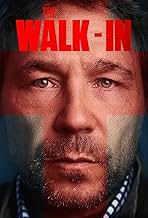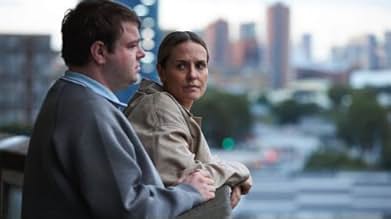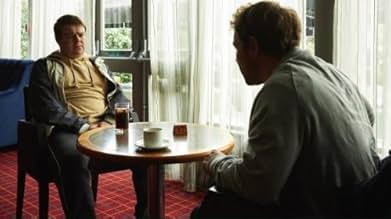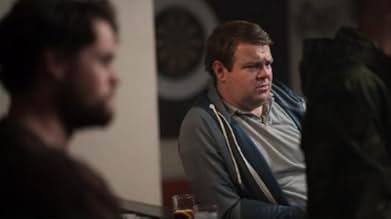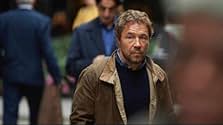The Walk-In
- TV Mini Series
- 2022
- 45m
A journalist tries to uncover the plans of a neo-Nazi organization that has been involved in the murder of an MP.A journalist tries to uncover the plans of a neo-Nazi organization that has been involved in the murder of an MP.A journalist tries to uncover the plans of a neo-Nazi organization that has been involved in the murder of an MP.
Browse episodes
Featured reviews
I thought Stephen Graham was truly fantastic in this gritty true to life turn of events that shows what actually happened in a real life case of an MP being murdered and all of the associated nonsense that went about prior to it happening.
It's a nonsensical and totally ridiculous murder that has the grounds for the entire story, but the way we get there is truly terrifying and very much an eye opener. As ever, Graham delivers an amazing performance and his supporting cast deliver a truly wonderful act of bringing us a masterpiece of British TV.
This is a hard watch but not because of brutal scenes, more that it requires a sane head to be able to compute it all.
It's a nonsensical and totally ridiculous murder that has the grounds for the entire story, but the way we get there is truly terrifying and very much an eye opener. As ever, Graham delivers an amazing performance and his supporting cast deliver a truly wonderful act of bringing us a masterpiece of British TV.
This is a hard watch but not because of brutal scenes, more that it requires a sane head to be able to compute it all.
I absolutely adore Stephen Graham who chooses tough, hard hitting drama rather than any routine roles offered to him.
So it's personally disappointing to only give this a 7/10 because I think it could have been so much better.
The real life situations are hard enough to bear, but when dramatised then I just felt that they should have had more impact.
Acting was great, direction was a bit iffy and the editing was bearable.
But here was something missing which I can't quite put my finger on.
Maybe there was more of a story here regarding the conversion of Graham's character, or a deeper analysis of the different right wing factions and how they differed from each other and what drove them apart.
I could be alone in this, but I was disappointed.
So it's personally disappointing to only give this a 7/10 because I think it could have been so much better.
The real life situations are hard enough to bear, but when dramatised then I just felt that they should have had more impact.
Acting was great, direction was a bit iffy and the editing was bearable.
But here was something missing which I can't quite put my finger on.
Maybe there was more of a story here regarding the conversion of Graham's character, or a deeper analysis of the different right wing factions and how they differed from each other and what drove them apart.
I could be alone in this, but I was disappointed.
This is TV drama at its best, well written, researched, directed and acted. I never usually watch anything on ITV as most of their output is made up of boring police series, but I'm glad I watched this compelling drama based on the book by Matthew Collins. Stephen Graham as always is excellent as is Andrew Ellis who plays Robbie. I found all of the performances realistic quite moving at times. The series is a warning to us all that we must stand up and fight the far right and their ideas wherever we come across them. My only complaint is the sheer number of adverts during each episode. In reality each episode is about 40 minutes long.
The Walk-In sets out to tackle a serious issue: the growing threat of far-right extremism in the UK. Based on true events, it follows Matthew Collins, a former neo-Nazi who now works as an anti-racism activist, attempting to infiltrate and stop a white supremacist group from carrying out a violent plot. While the series' intentions are good, aiming to highlight the dangers of radicalization, its approach leaves much to be desired.
The first thing that stands out is the series' dramatization of neo-Nazi groups openly marching and demonstrating in public. While such groups undoubtedly exist, the portrayal of them as easily identifiable and brazenly active in the streets of the UK is, to put it bluntly, exaggerated. Most far-right groups today operate in the shadows, using online platforms and encrypted chats to spread their message-far removed from the kind of public Nazi marches shown in The Walk-In. The series risks inflating the threat by focusing on the spectacle rather than the more subtle, insidious methods of recruitment and radicalization that are far more common in today's climate.
For those who have lived in the UK and followed the political landscape closely, the portrayal of white supremacy as a visible, openly confrontational force feels out of touch. Instead of focusing on the quiet, dangerous ways extremist ideologies spread-through online echo chambers and hidden networks-the show leans into sensationalism for dramatic effect. This kind of exaggerated portrayal not only misrepresents the nature of the threat but also feels like a piece of politically charged content rather than a nuanced exploration of the issue.
While there is value in shedding light on the dark reality of far-right extremism, the series risks contributing to a narrative that may feel more like propaganda than a genuine attempt to inform. The danger here is that by making the threat of white supremacy seem like an obvious, easy-to-spot issue, The Walk-In distracts from the real, subtle ways these groups influence minds and shape society today.
Ultimately, The Walk-In serves as a reminder of the risks of sensationalizing complex issues. By pushing a narrative that plays into the fear-mongering of the far left, it feels disconnected from the reality that many of us live in. A more grounded, realistic portrayal would have been far more impactful, offering a clearer understanding of how extremism truly operates in modern Britain.
The first thing that stands out is the series' dramatization of neo-Nazi groups openly marching and demonstrating in public. While such groups undoubtedly exist, the portrayal of them as easily identifiable and brazenly active in the streets of the UK is, to put it bluntly, exaggerated. Most far-right groups today operate in the shadows, using online platforms and encrypted chats to spread their message-far removed from the kind of public Nazi marches shown in The Walk-In. The series risks inflating the threat by focusing on the spectacle rather than the more subtle, insidious methods of recruitment and radicalization that are far more common in today's climate.
For those who have lived in the UK and followed the political landscape closely, the portrayal of white supremacy as a visible, openly confrontational force feels out of touch. Instead of focusing on the quiet, dangerous ways extremist ideologies spread-through online echo chambers and hidden networks-the show leans into sensationalism for dramatic effect. This kind of exaggerated portrayal not only misrepresents the nature of the threat but also feels like a piece of politically charged content rather than a nuanced exploration of the issue.
While there is value in shedding light on the dark reality of far-right extremism, the series risks contributing to a narrative that may feel more like propaganda than a genuine attempt to inform. The danger here is that by making the threat of white supremacy seem like an obvious, easy-to-spot issue, The Walk-In distracts from the real, subtle ways these groups influence minds and shape society today.
Ultimately, The Walk-In serves as a reminder of the risks of sensationalizing complex issues. By pushing a narrative that plays into the fear-mongering of the far left, it feels disconnected from the reality that many of us live in. A more grounded, realistic portrayal would have been far more impactful, offering a clearer understanding of how extremism truly operates in modern Britain.
Writer Jeff Pope is no stranger to true life dramas having previously written the excellent 'Little boy blue' (also starring Stephen Graham) about the tragic murder of Rhys Jones in Liverpool.
This is another meticulously researched piece looking at a racist far-right group through the events surrounding the sickening murder of MP Jo Cox in 2016 and a vicious attack on a Sikh dentist, Dr Sarandev Bhambra in 2015.
Its a hard watch and given the politics it could easily have become a point scoring piece but instead chooses to let the true events speak for themselves.
Sensible viewers watching this will draw the same conclusions, don't let the haters win and stand up against hatred wherever you see it. Its moving and important TV that deserves to be widely seen.
It was very well made in all departments - the cast were excellent and authentic. My only criticism would be the length, I think it would have worked better and been tighter over 3 or 4 episodes rather than 5.
This is another meticulously researched piece looking at a racist far-right group through the events surrounding the sickening murder of MP Jo Cox in 2016 and a vicious attack on a Sikh dentist, Dr Sarandev Bhambra in 2015.
Its a hard watch and given the politics it could easily have become a point scoring piece but instead chooses to let the true events speak for themselves.
Sensible viewers watching this will draw the same conclusions, don't let the haters win and stand up against hatred wherever you see it. Its moving and important TV that deserves to be widely seen.
It was very well made in all departments - the cast were excellent and authentic. My only criticism would be the length, I think it would have worked better and been tighter over 3 or 4 episodes rather than 5.
Did you know
- TriviaMarcia's Cafe where Robbie and Matthew meet for the first time, is the same cafe that is present in the Top Boy series.
- ConnectionsReferenced in The Graham Norton Show: Stormzy/Geena Davis/Stephen Graham/Motsi Mabuse (2022)
- How many seasons does The Walk-In have?Powered by Alexa
Details
Contribute to this page
Suggest an edit or add missing content

![Watch Trailer Season 1 [OV]](https://m.media-amazon.com/images/M/MV5BNTY0OGNiYjctOGY3NC00MzU2LWIwNGUtODY2NGRlNDM1NzI1XkEyXkFqcGdeQXRyYW5zY29kZS13b3JrZmxvdw@@._V1_QL75_UX500_CR0)

